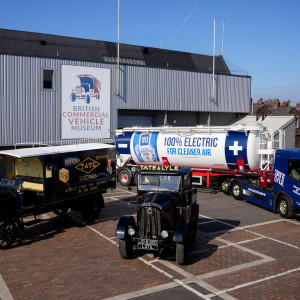Driving Change: Tate & Lyle Sugars with 100% Electric Lorries


- Tate & Lyle Sugars is moving towards cleaner logistics with the introduction of two fully electric lorries, saving 55,000 diesel miles annually - the equivalent distance of driving from London to Sydney, and back again, twice - improving air quality by lowering emissions
- Transition to electric is part of business' commitment to be the most ethical and sustainable cane sugar refiner in the world.
Tate & Lyle Sugars continue to push sustainability with the introduction of two brand-new 100% electric Volvo lorries, operating around London from April 2025. Transport emissions are one of the leading contributors to urban air pollution, and Tate & Lyle Sugars' investment in fully electric lorries marks a step towards supporting cleaner, healthier cities and reaching its carbon neutrality targets in the UK by 20401. Unlike traditional diesel lorries, which emit pollutants such as nitrogen oxides and carbon dioxide that exacerbate air pollution and climate change, these electric alternatives produce zero tailpipe emissions.
The investment highlights Tate & Lyle Sugars' ambition and commitment to becoming the most ethical and sustainable cane sugar refiner in the world, and its pledge to reduce emissions, thereby improving urban air quality. To honour its heritage while working for a cleaner future, Tate & Lyle Sugars unveiled one of its new electric lorries outside the British Commercial Vehicle Museum in Leyland, Lancashire, which charts the UK's commercial vehicle history since the 1800s and proudly exhibits a number of the company's retired commercial vehicles. Chorley is also a neighbouring Lancashire town where sugar merchant, philanthropist, and one of the founders of the company Sir Henry Tate, was born in 1819.
To emphasise its evolution, a number of historic vehicles were proudly lined up and displayed outside the museum, including a horse and cart, used by Tate & Lyle Sugars to move sugar within the refinery until 1954, and two vintage vehicles; a 1913 McCurd and a 1932 Latil. The McCurd is the only surviving vehicle of its type in the world and even appeared in the film 'Chitty Chitty Bang Bang'. It was restored as a box van in the 'Tate Sugars' livery after being used by troops during the war.
The French manufacturer, Latil, produced the versatile Latil four-wheel drive road tractor under licence in England by Shelvoke and Drury and it was used by Tate & Lyle Sugars throughout the 1930s. Two cutting-edge Volvo electric lorries are now in operation at Tate & Lyle Sugars, serving key logistics routes in East London. One vehicle handles palletised product transfers from the Thames Refinery to an external warehouse, while the other manages bulk deliveries to major customers within the M25 and also handles sugar movements between the Thames Refinery and Plaistow factories.
Volvo has provided comprehensive hands-on training to drivers, ensuring optimal performance and battery efficiency. They will also repurpose end-of-life EV batteries for second-life energy storage to minimise waste. A recent survey by Tate & Lyle Sugars revealed that 67%2 of consumers view businesses more positively when they utilise electric vehicles, further reinforcing the necessity of sustainable operations within the supply chain.
Saving 55,000 diesel miles annually, this is roughly the distance of driving from London to Sydney and back twice, 7 round-trip flights from London to New York, 82 return coach trips between London and Edinburgh or traveling the entire length of the UK (Land's End to John o' Groats) 63 times. Andrew Jones, President of Tate and Lyle Sugars, commented: "The introduction of our 100% electric lorries marks another step forward in our commitment to being one of the world's most ethical and environmentally responsible cane sugar refiners. "We continually explore ways to make our logistics more sustainable -- from optimising vehicle payloads to choosing greener transport methods -- and remain focused on working with our customers and suppliers to build a more sustainable supply chain.
"The commemorative event at the British Commercial Vehicle Museum also celebrated this progress, showcasing our journey from 1878 to today.
"This latest move honours our heritage while accelerating our vision for a cleaner future."
Transport & Logistics - Driving The Industry Forward